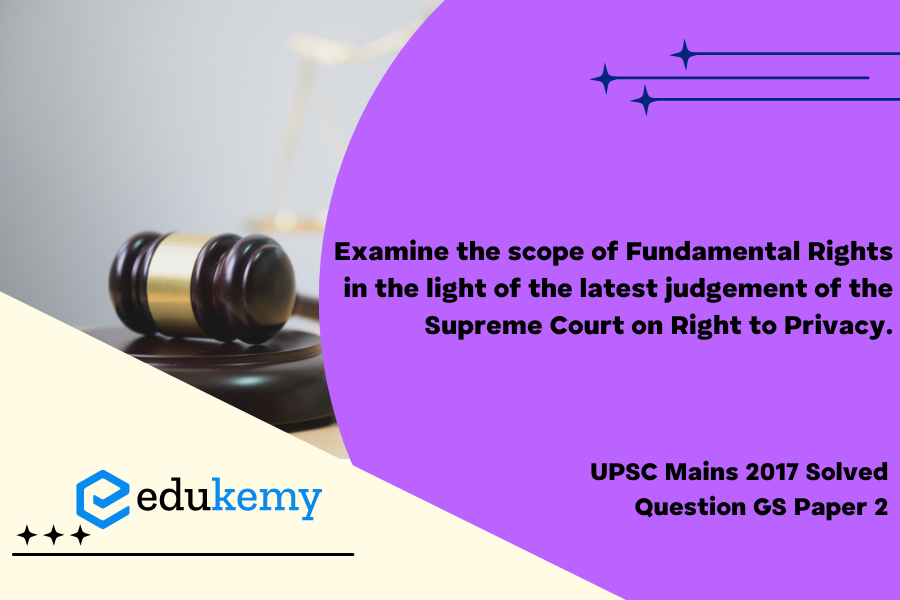In recent times, the intersection of individual liberties and the evolving landscape of technology has thrust the concept of Fundamental Rights into the forefront of legal discourse. The scope of Fundamental Rights, enshrined in the Constitution of a democratic nation, is a dynamic domain constantly shaped by judicial interpretations. The latest landmark judgement of the Supreme Court on the Right to Privacy has not only elevated the status of privacy to that of a fundamental right but has also broadened the horizons of individual freedoms in the digital age. As society becomes increasingly interconnected, questions regarding the protection of personal information and the boundaries of state intrusion have become pivotal. This judgement, drawing from a nuanced understanding of the constitutional ethos, not only redefines the contours of privacy but also lays down a foundation for a robust framework safeguarding other Fundamental Rights. The Supreme Court’s articulation of the Right to Privacy as an intrinsic part of the broader constitutional guarantees not only underscores the adaptability of Fundamental Rights but also necessitates a critical examination of their scope in contemporary contexts. This essay delves into the implications of the latest Supreme Court judgement, scrutinizing its impact on the broader canvas of Fundamental Rights and elucidating the evolving dimensions of individual freedoms in the light of the Right to Privacy.
Tag: Indian constitution, Current Affairs.
Contents
Decoding the Question:
- In Introduction, briefly write about the recent Supreme Court judgement on Right to Privacy.
- In Body,
- Discuss the scope of judgement.
- Mention some concerns related to it.
- In Conclusion, write the overall significance of the judgement.
Answer:
In a recent judgement, the Constitution Bench of the Supreme Court has expanded the scope of Fundamental Rights further by ruling that right to privacy is intrinsic to right to life and personal liberty under article 21 and is inherently protected under the various fundamental rights enshrined under Part III of the Indian Constitution. Now a person can move the Constitutional courts of the land under Articles 32 and 226, to get justice.

Scope of the judgment:
- The concept of privacy is embedded in the right to liberty/dignity and everything done in the exercise of freedom could be attributed to privacy. Therefore different kinds of freedom guaranteed under Article 19 will also get amplified and all the legislative acts and executive actions will have to meet the rigours of right to privacy.
- Similarly, the right to equality under Article 14 can only be exercised through liberty and freedom of choice.
- It has also recognized the impact that non-state actors can have on personal privacy particularly in the context of informational privacy on the Internet.
- The court recognised an individual’s Right to Privacy regarding his sexual choices, which favours the decriminalization of homosexuality in India.
- It has implications for the government’s vast biometric ID scheme, access to benefits, bank accounts and payment of taxes.
- Three elements are considered as the core to the right to privacy: Personal autonomy, the freedom to make choices and the right to determine what happens with information about oneself. It will question the Aadhaar scheme, being enforced by the government to avail different kinds of public services. However the constitutional validity of the Aadhar scheme is yet to be decided by the Constitutional Bench of the Supreme Court.
Challenges in Protecting the Right to Privacy:
- The government can use mass surveillance programmes to protect national security and interest.
- With the growing use of the internet and technology, data has become new oil. The protection of data and privacy is a huge concern.
Thus the right to privacy will be tested on a case-to-case basis. However, the judgement of the Supreme Court will open a new path for securing privacy, liberty, equality and a dignified life for the common man. It will also help create a robust legal framework for privacy in India. It is essential for the dignity of human beings; hence the government can consider the recommendations of BN Shrikrishna committee and prepare a comprehensive right-oriented based data protection legislation to address the challenges.
In case you still have your doubts, contact us on 9811333901.
For UPSC Prelims Resources, Click here
For Daily Updates and Study Material:
Join our Telegram Channel – Edukemy for IAS
- 1. Learn through Videos – here
- 2. Be Exam Ready by Practicing Daily MCQs – here
- 3. Daily Newsletter – Get all your Current Affairs Covered – here
- 4. Mains Answer Writing Practice – here


